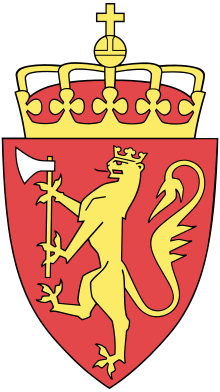Sel
Sel is a municipality in Innlandet county, Norway. It is part of the traditional region of the Gudbrand Valley. The administrative centre of the municipality is the town of Otta.
Sel kommune | |
|---|---|
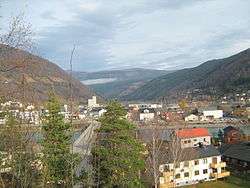 Town of Otta | |
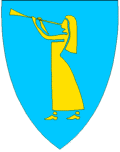 Coat of arms 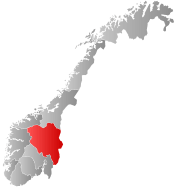 Innlandet within Norway | |
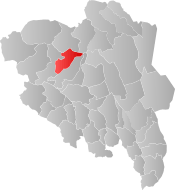 Sel within Innlandet | |
| Coordinates: 61°49′1″N 9°34′24″E | |
| Country | Norway |
| County | Innlandet |
| District | Gudbrandsdal |
| Administrative centre | Otta |
| Government | |
| • Mayor (2003) | Dag Erik Pryhn (Ap) |
| Area | |
| • Total | 905 km2 (349 sq mi) |
| • Land | 888 km2 (343 sq mi) |
| Area rank | 124 in Norway |
| Population (2004) | |
| • Total | 6,088 |
| • Rank | 164 in Norway |
| • Density | 7/km2 (20/sq mi) |
| • Change (10 years) | -4.4% |
| Demonym(s) | Selvær[1] |
| Time zone | UTC+01:00 (CET) |
| • Summer (DST) | UTC+02:00 (CEST) |
| ISO 3166 code | NO-3437 |
| Official language form | Neutral[2] |
| Website | www |
The new municipality of Sel was created on 1 January 1908 when it was separated from Vågå municipality. The former municipality of Heidal was merged into Sel municipality on 1 January 1965.
General information
Name
The municipality (originally the parish) is named after the old Sel farm (Old Norse: Sil), since the first church was built there. The name is identical with the word sil which means "slowly running and quiet part of a river" (here meaning the Gudbrandsdalslågen).[3]
Coat-of-arms
The coat-of-arms is from modern times. They were granted on 18 May 1985. The arms show a gold-colored girl playing a trumpet on a blue background. The image is based on the local Prillar-Guri legend. In 1612, a Scottish army marched through the area on its way to Sweden. They were stopped by the local farmers at the Battle of Kringen. The legend tells that the farmers were warned for the Scots by a local girl with a trumpet.[4][5]
| Ancestry | Number |
|---|---|
| 57 | |
| 43 | |
| 38 | |
| 35 | |
| 25 | |
| 19 | |
| 16 |
Geography
Sel is bordered on the north by Dovre and Vågå municipalities, and on the south by Nord-Fron municipality. To the northeast it is bordered by Folldal municipality in Hedmark county. Large parts of the very first national park in Norway, Rondane National Park is situated in the municipality of Sel and has its main entrances from the mountain villages of Høvringen and Mysuseter.
Although it has a small population, Sel is one of the more scenic and historically significant areas of the Gudbrand Valley. A large concentration of Norway’s heritage-listed farms is located in Heidal in Sel municipality (Heidal became part of Sel municipality in 1965).
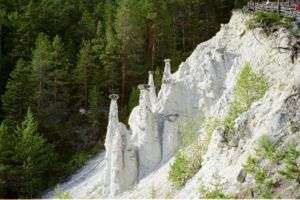
Otta, named after the Otta River, is the population center. Otta lies at the point where the Otta River joins the Gudbrandsdalslågen from the west. The Otta River leads up to the historically important Vågå and Lom regions and the passes to the west over Jotunheimen.[7]
Attractions
- Jørundgard Medieval Center - This reconstructed 14th century medieval farm, the location of Sigrid Undset's novel "Kristin Lavransdatter", was the site of a 1994 filming of Kransen. The buildings were furnished in medieval style for the film. It is open to the public and traditional crafts are demonstrated by staff, providing a uniquely medieval look at Norwegian history.[8]
- Pilgrim's Route/Old Kings Road - The Pilgrim's Route and Old King's Road passes through Sel on its way through the Gudbrand Valley and northwards over Dovrefjell mountains near present-day Dombås in the Dovre municipality.[9]
- Selsverket - Sel municipality has a long tradition in mining and quarrying for minerals, soapstone, and slate. Selsverket was the copper works from the 18th century which was located approximately 2 kilometers north of Otta. There were also copper works in neighboring Folldal.[8]
- Sel Church - The church at Selsverket was built in 1742. It is constructed of logs.[8]
- Steinberget Fortress - Built in the pre-Christian period, the Steinberget fortress is now a jumble of rock along European route E6.[9]
- Kringen - In 1612, a peasant militia ambushed Scots marching to support Sweden at Kringen (the narrowest part of the Gudbrand Valley, just below the confluence of the Otta and the Gudbrandsdalslågen). As the Scots reached the ambush site of Prillarguri hill, legend has it that Prillar-Guri, riding on the other side of the lågen, distracted the Scots until they were in the right position. She then sounded a blast with her prillarhorn (a ram's horn), and the Battle of Kringen began. A monument can be found there today, and she's also found on Sel's coat-of-arms today.[8]
- Hilltop Fortress - West of Prillarguri hill is another hilltop fortress, protected by a sheer drop on three sides and walls on the fourth side, which was built in the period from 300 to 600 AD.[8]
- Ula Dam - In 1877-1879 the Norwegian parliament ordered construction of the Ula Dam to stop gravel and rock transported by the Ula River from blocking the Gudbrandsdalslågen and flooding the fertile valley floor. The debris washed down by the Ula in 1789 destroyed the houses at Selsverket and rerouted the Gudbrandsdalslågen, such that the farms along the Sel became marshes.[8]
References
- "Navn på steder og personer: Innbyggjarnamn" (in Norwegian). Språkrådet.
- "Forskrift om målvedtak i kommunar og fylkeskommunar" (in Norwegian). Lovdata.no.
- Rygh, Oluf (1900). Norske gaardnavne: Kristians amt (in Norwegian) (4 ed.). Kristiania, Norge: W. C. Fabritius & sønners bogtrikkeri. p. 88.
- Norske Kommunevåpen (1990). "Nye kommunevåbener i Norden". Archived from the original on 4 March 2016. Retrieved 3 January 2009.
- "History about Sel municipality coat of arms - kommunevåpen". Sel kommune. Retrieved 3 January 2009.
- "Immigrants and Norwegian-born to immigrant parents, by immigration category, country background and percentages of the population". ssb.no. Archived from the original on 2 July 2015. Retrieved 29 June 2015.
- Taylor-Wilkie, Doreen, ed. (1996). Insight Guides Norway (2 ed.). Houghton Mifflin Company. ISBN 978-0-395-81912-8.CS1 maint: extra text: authors list (link)
- Stagg, Frank Noel (1956). East Norway and its Frontier. George Allen & Unwin, Ltd.
- Welle-Strand, Erling (1996). Adventure Roads in Norway. Nortrabooks. ISBN 978-82-90103-71-7.
External links
| Wikimedia Commons has media related to Sel. |
| Look up Sel in Wiktionary, the free dictionary. |
- Municipal fact sheet from Statistics Norway


- Official website (in Norwegian)
